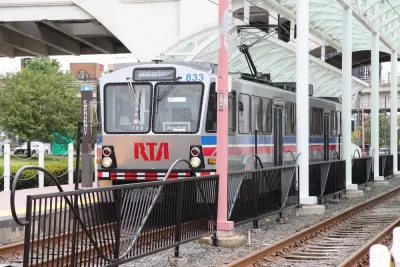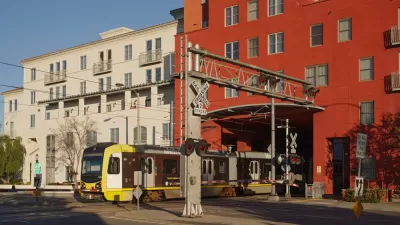The growth of transit-oriented development in the Cleveland region is being hindered by zoning codes that limit housing density and excessive parking requirements that drive up construction costs, new research suggests.

“New research by the Cuyahoga County Planning Commission offers fresh evidence that Cleveland and surrounding suburbs would be smart to rezone transit corridors to encourage dense, walkable, transit-oriented development, or TOD,” reports Steven Litt for Cleveland.com.
While market demand for transit-oriented development in Cleveland is growing, in many cases, developers still have to go through a cumbersome and expensive process to get permits to build TOD. “The data show that between 2012 and 2021, some 383 new developments added nearly $3 billion in real estate value through new construction or building renovations in the transit corridors.”While not every project is ‘transit-friendly,’ the study’s authors say “the new wave of development shows that to a significant extent, transit-oriented development is already happening in the core of the region because the market is demanding it.”
The research is part of an initiative to encourage transit-oriented development and assess how zoning changes can stimulate more housing production near transit lines. The four-phase project “will include identifying areas that could be targeted for transit-oriented development, drafting model codes, and identifying financial mechanisms and incentives.”
According to the study, the momentum for boosting development along transit in many Cleveland suburbs is stymied by outdated zoning codes and parking requirements, as well as disparate regulations among different suburbs. The authors suggest that Cuyahoga County could help suburbs develop their zoning plans with an eye to housing development, connectivity, and walkability. For its part, the county sees TOD as “an opportunity to add population and rebuild the tax base after decades of sprawl sapped its strength.”

Alabama: Trump Terminates Settlements for Black Communities Harmed By Raw Sewage
Trump deemed the landmark civil rights agreement “illegal DEI and environmental justice policy.”

Planetizen Federal Action Tracker
A weekly monitor of how Trump’s orders and actions are impacting planners and planning in America.

How Atlanta Built 7,000 Housing Units in 3 Years
The city’s comprehensive, neighborhood-focused housing strategy focuses on identifying properties and land that can be repurposed for housing and encouraging development in underserved neighborhoods.

In Both Crashes and Crime, Public Transportation is Far Safer than Driving
Contrary to popular assumptions, public transportation has far lower crash and crime rates than automobile travel. For safer communities, improve and encourage transit travel.

Report: Zoning Reforms Should Complement Nashville’s Ambitious Transit Plan
Without reform, restrictive zoning codes will limit the impact of the city’s planned transit expansion and could exclude some of the residents who depend on transit the most.

Judge Orders Release of Frozen IRA, IIJA Funding
The decision is a victory for environmental groups who charged that freezing funds for critical infrastructure and disaster response programs caused “real and irreparable harm” to communities.
Urban Design for Planners 1: Software Tools
This six-course series explores essential urban design concepts using open source software and equips planners with the tools they need to participate fully in the urban design process.
Planning for Universal Design
Learn the tools for implementing Universal Design in planning regulations.
Jessamine County Fiscal Court
Caltrans
Institute for Housing and Urban Development Studies (IHS)
City of Grandview
Harvard GSD Executive Education
Toledo-Lucas County Plan Commissions
Salt Lake City
NYU Wagner Graduate School of Public Service





























